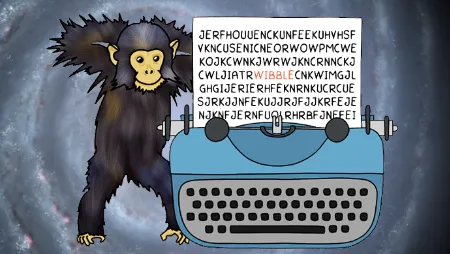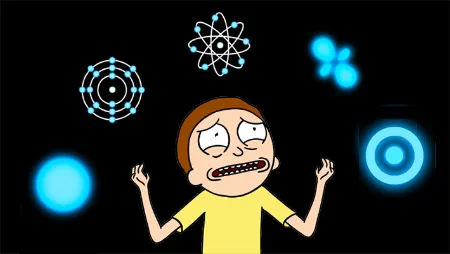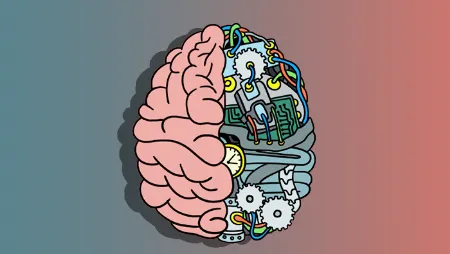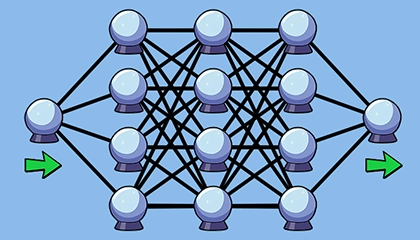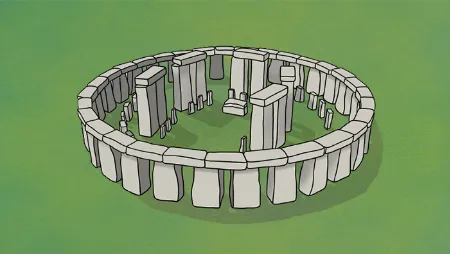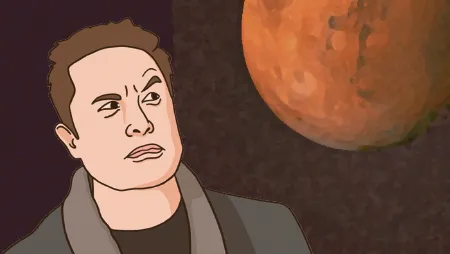Having spent 30 years writing science fiction classics, Isaac Asimov turned his efforts to educating an America that dangerously neglected science. Here's how the great scientist and author understood the world of the 20th century, giving us insights as relevant today as ever before.
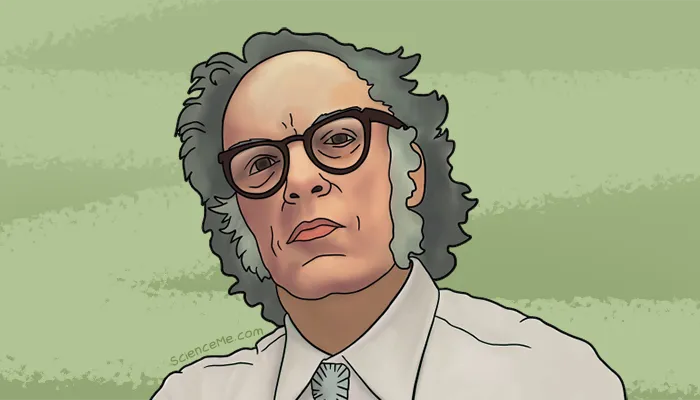
Born in Petrovichi, Russia, in 1920, Isaac Asimov had a rough first year. He was one of 16 children in the village to develop double pneumonia—and the only one to survive.
The Asimov family migrated to Brooklyn, New York, when he was three years old. He taught himself to read at age five using the magazines and newspapers sold in his parent's chain of candy stores.
"Self-education is, I firmly believe, the only kind of education there is. The only function of a school is to make self-education easier; failing that, it does nothing. - Isaac Asimov
By age 17, Asimov aspired to write professionally. He produced his first science fiction story, Cosmic Corkscrew in 1937. It was about a man who travelled into the future to find the Earth deserted, but could never return in time to find out what happened.
The story was rejected by Astounding Science Fiction and was eventually lost.
"So the universe is not quite as you thought it was? You'd better rearrange your beliefs, then. Because you certainly can't rearrange the universe. - Isaac Asimov
Science Studies and Early Career
As an undergraduate, Asimov originally studied Zoology, switching to Chemistry citing his reluctance to dissect a cat. He earned a Masters in Chemistry and then a Doctor of Philosophy in Biochemistry by 1948.
"I believe in evidence. I believe in observation, measurement, and reasoning, confirmed by independent observers. I'll believe anything, no matter how wild and ridiculous, if there is evidence for it. The wilder and more ridiculous something is, however, the firmer and more solid the evidence will have to be. - Isaac Asimov
Between his studies, he served as a civilian in the Navy for three years, and was drafted into the US Army, serving for nine months before receiving an honourable discharge. He also met his first wife, Gertrude Blugerman, and they went on to have two children together before separating in 1970.
"Maybe happiness is this: not feeling like you should be elsewhere, doing something else, being someone else. - Isaac Asimov
Back in academia, Asimov became a professor of Chemistry at the Boston University School of Medicine, while writing science fiction stories in his free time. However, writing remained his passion and he pared back his work at the university to write prolifically.
Science Fiction Epics
He created science fiction exclusively in the early years, including I, Robot (1950), a groundbreaking collection of short stories based on his Three Laws of Robotics and the concept of robots with positronic brains living among humans.
"Part of the inhumanity of the computer is that, once it is competently programmed and working smoothly, it is completely honest. - Isaac Asimov
He would later convert I, Robot into a screenplay with the help of the sci-fi author Harlan Ellison (see his fascinating collection, Angry Candy) however the screenplay was never filmed. Instead, the eventual 2004 movie was based on an outside script which retrospectively incorporated Asimov's concepts.
The 1999 movie Bicentennial Man was also based on a short story by Asimov, which he and Robert Silverberg adapted into the novel The Positronic Man (1994).
"Writing, to me, is simply thinking through my fingers. - Isaac Asimov
Asimov's famed Foundation novels depict a vast interstellar empire shaped by psychohistory, in which the future of humanity can be predicted through mathematical calculations and the principle of determinism. These were collated in his books Foundation: Trilogy (1951), Foundation and Empire (1952) and Second Foundation (1953), and made into a TV series in 2021.
"Humanity has the stars in its future, and that future is too important to be lost under the burden of juvenile folly and ignorant superstition. - Isaac Asimov
Asimov's The Last Question (1956) was centred on the ability of mankind to reconcile and reverse the process of entropy. It was his personal favourite story.
"I undertook to tell several trillion years of human history in the space of a short story and I leave it to you as to how well I succeeded. I also undertook another task, but I won't tell you what that was lest l spoil the story for you. - Isaac Asimov
In 1968, the Science Fiction Writers of America voted Asimov's Nightfall (1941) the best science fiction short story ever. The hook: on a planet with six suns, night is about to fall for the first time in two thousand years and bring about the end of civilisation.
He later described Nightfall as an archetypal example of social science fiction developed in the 1940s, where authors moved away from gadgets and space opera and towards sci-fi based explorations of the human condition.
In his later career, Isaac Asimov switched away from science fiction and focused on writing non-fiction in the popular science genre.
"In 1969 the United States went into a kind of tizzy, and so did I. I was overcome by the ardent desire to write popular science for an America that might be in great danger through its neglect of science. - Isaac Asimov
Writing Science Fact
Asimov wrote hundreds of regular non-fiction columns in Fantasy and Science Fiction which were periodically collected into books and gave Asimov a reputation as a great explainer of science. He wrote reference works, such as The Intelligent Man's Guide to Science (1960) and urged other sci-fi writers to do the same.
"There is a cult of ignorance in the United States, and there has always been. The strain of anti-intellectualism has been a constant thread winding its way through our political and cultural life, nurtured by the false notion that democracy means that my ignorance is just as good as your knowledge. - Isaac Asimov
During his career, Asimov won dozens of awards and 14 honorary doctorate degrees from universities.
The Death of Asimov
At the age of 57, he suffered from a heart attack and underwent lifesaving triple bypass surgery, contracting HIV from a blood transfusion in the process. His medical status was shrouded in secrecy due to fear of public prejudice, and he died in 1992 in New York City.
Ten years later, after most of his physicians had passed away themselves, his second wife, Janet Asimov, went public with his true cause of death.
Asimov on Writing
"There is a single light of science, and to brighten it anywhere is to brighten it everywhere. - Isaac Asimov
Asimov's approach to writing science fiction saw him imagine an ending first, then a beginning, then "let everything in-between work itself out as I come to it".
He would type a draft, edit it by hand, then re-type the final version. Further edits were, to him, "like chewing used gum" and he believed writing multiple revisions meant the work as a whole was a failure. His prose became known for its clear, direct voice, and he refused to dress his narrative in literary devices.
"I made up my mind long ago to follow one cardinal rule in all my writing—to be clear. I have given up all thought of writing poetically or symbolically or experimentally, or in any of the other modes that might (if I were good enough) get me a Pulitzer prize. I would write merely clearly and in this way establish a warm relationship between myself and my readers, and the professional critics—well, they can do whatever they wish." - Isaac Asimov
Thanks to his extensive scientific training, Asimov was a sober rationalist, and found it his personal mission to convey this kind of thinking to the public.
"It is no defense of superstition and pseudoscience to say that it brings solace and comfort to people... If solace and comfort are how we judge the worth of something, then consider that tobacco brings solace and comfort to smokers; alcohol brings it to drinkers; drugs of all kinds bring it to addicts; the fall of cards and the run of horses bring it to gamblers; cruelty and violence bring it to sociopaths. Judge by solace and comfort only and there is no behavior we ought to interfere with. - Isaac Asimov
In fact, he was a man driven by the need to devour knowledge and run it through his unique Asimov-filter, to communicate philosophical and scientific ideas for the betterment of society.
Through his work, Isaac Asimov was intent on raising the intellectual awareness of humanity. He feared that without such change, society would be its own downfall.
"Suppose that we are wise enough to learn and know—and yet not wise enough to control our learning and knowledge, so that we use it to destroy ourselves? Even if that is so, knowledge remains better than ignorance. It is better to know — even if the knowledge endures only for the moment that comes before destruction — than to gain eternal life at the price of a dull and swinish lack of comprehension of a universe that swirls unseen before us in all its wonder. That was the choice of Achilles, and it is mine, too. - Isaac Asimov
